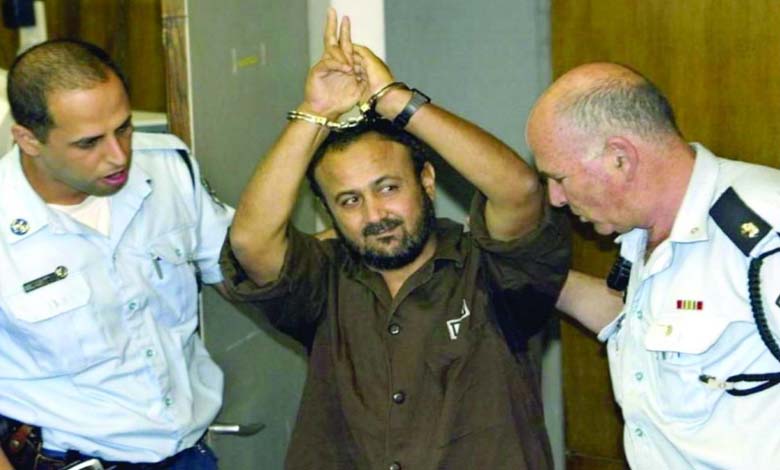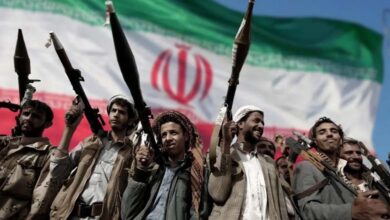Who is Marwan Barghouti, a symbol of Palestinian resistance and prisoners’ icon?

In the depths of Israeli prisons, Marwan Barghouti’s name shines as one of the most prominent symbols of Palestinian resistance and an icon for prisoners. For decades, his name has been synonymous with the national struggle, not only through his long years of imprisonment but also due to his political journey filled with milestones that embody his commitment to his country’s cause.
-
The Day After the War: What the Palestinian Authority Wants in Gaza
-
How has the Muslim Brotherhood exploited the Palestinian cause to serve its own agendas?
Recent discussions about prisoner exchange deals between Israel and Hamas, particularly after the latest escalation in Gaza, have brought Marwan Barghouti back to the forefront of the political scene. With Hamas explicitly demanding his release, questions arise about his future role and the potential impact of his release on the Palestinian landscape as a whole.
Barghouti’s rise: From a young resister to a national icon
Born in 1958 in the village of Kober, Ramallah Governorate, Marwan Barghouti began his struggle early, joining the Fatah movement at the age of 15. He was first arrested at 18, a transformative experience where he learned Hebrew and earned his high school diploma behind bars.
-
Transferring Her Body, He Did Not Know It Was His Mother… The Story of a Palestinian Paramedic in Gaza
-
Analyst: Displacement of the Palestinian People is a Key Goal of the Israeli Occupation
After his release, he enrolled at Beir Zeit University, where he studied history and political science. He later became the president of its student council and founded the “Shabiba Fatah” organization, which played a pivotal role in the first Palestinian Intifada in 1987.
Exile in Jordan and partnership in the struggle
Exiled to Jordan for his anti-Israel activities, Barghouti closely collaborated with the late Palestinian leader Khalil al-Wazir, known as “Abu Jihad,” witnessing key milestones in Palestinian resistance.
-
“Bridge of Dignity”: The Palestinians’ “Triple Nationality” Gateway to the World
-
“Humiliation and mistreatment” of Palestinian prisoners: a “routine exercise” in Israeli prisons
This phase continued until his return to Palestine in 1994 under the Oslo Accords, marking the beginning of a new chapter in his political career.
Arrest and trials
Israel accused Barghouti of leading the second Intifada and arrested him in 2002 while he was serving as the Secretary-General of Fatah in the West Bank. Tried on multiple charges, he was sentenced to five life imprisonments. Over nearly two decades in detention, he became a symbol of resistance and defiance.
-
Spokeswoman for the Palestinian Red Crescent: The Israeli Occupation Targets Hospitals in Gaza
-
Israel’s Withdrawal and Gaza’s Return to Palestinian Authority: Abbas’s Vision for the Post-War Era
Barghouti in Palestinian and Israeli dynamics
Marwan Barghouti’s name often arises in discussions about prisoner exchanges. For Hamas, his release represents a significant political and popular achievement, as he is a unifying figure widely admired by the Palestinian public.
Opinion polls show him as the leading candidate to succeed President Mahmoud Abbas, making him a crucial leverage point in negotiations.
Although a prominent Fatah member, Barghouti’s political positions sometimes align with Hamas, especially regarding the peace process with Israel.
-
Palestinian Analyst: UAE Relief Efforts Form Integrated Humanitarian Strategy in Gaza
-
CNN: New Israeli Evacuation Orders for Thousands of Palestinians in Gaza
A potential leader or an eternal icon?
Many observers believe that Barghouti’s release could reshape the Palestinian Authority, especially amid the current divisions among factions. As a figure with broad popular acceptance, he could rebuild Palestinian national unity.
Personal and intellectual legacy
Beyond his political struggle, Marwan Barghouti is a prolific writer. He authored several books during his imprisonment, including “A Thousand Days in Solitary Confinement”, where he shares his testimony about life behind bars and his resistance experience.
-
Palestinian Analyst highlights harsh humanitarian conditions in Gaza
-
Exploiting Palestinian Suffering… How the Muslim Brotherhood Capitalized on the Gaza War
-
Euronews: Humanitarian Aid Reaches Gaza, Desperation Grips Palestinians












